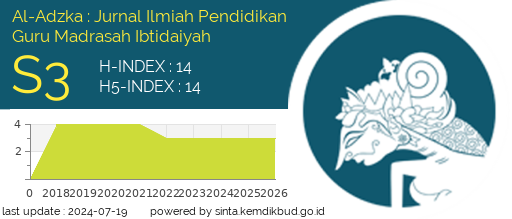PENILAIAN AUTENTIK KOMPONEN MATEMATIKA PADA PEMBELAJARAN TEMATIK BERDASARKAN KURIKULUM 2013 DI KELAS IV SDN SEMANGAT DALAM 2 TAHUN PELAJARAN 2013/2014
DOI:
https://doi.org/10.18592/aladzkapgmi.v5i1.1627Keywords:
Curriculum 2013, Thematic Learning, Authentic Assessment, MathematicsAbstract
This study aims to determine how the authenticity evaluation mathematics component on thematic learning based on 2013 curriculum in class IV SDN 2 Semangat Dalam in academic year 2013/2014. This research is a field research using qualitative approach and descriptive method. Subject in this study is fourth grade teacher class C. While becoming object in this research is authentic evaluation Mathematics Components on Thematic Learning. The results showed that the mathematical component of authentic assessment on thematic learning based curriculum in 2013 in class IV SDN 2 Semangat Dalam in academic year 2013/2014 have not been fully able to carry out in accordance with the demands of the curriculum in 2013, but the activities undertaken by teachers has been implemented as expected in government 2013. In lesson plan, teacher has already contained authentic assessment such as observation, written test (exercise), assignments and performance assessment. Observation technique is used in implementation of the assessment to the teacher’s attitude, written test (exercises and assignments or homework are used to the teacher's knowledge competence assesment, whereas for competency skills of teachers use performance assessment. For the implementation of the examination in the end of the semester, teacher manages grades and reports student learning outcomes in SDN Semangat Dalam 2 based on school policyReferences
Ahmadi, Abu dan Nur Uhbiyati, Ilmu Pendidikan, Jakarta, PT Rineka Cipta, 2007.
Asmani, Jamal Ma’mur, Tuntunan Lengkap Metodologi Praktis Penelitian Pendidikan, Yogyakarta, DIVA Press, 2011.
Badan Pengembangan Sumber Daya Manusia Pendidikan dan Kebudayaan dan Penjaminan Mutu Pendidikan, Contoh Penerapan Penilaian Autentik SD Kelas IV, Jakarta, Kementerian Pendidikan dan Kebudayaan, 2013.
Badan Pengembangan Sumber Daya Manusia Pendidikan dan Kebudayaan dan Penjaminan Mutu Pendidikan, Konsep Penerapan Penilaian Autentik pada Proses dan Hasil Belajar, Jakarta, Kementerian Pendidikan dan Kebudayaan, 2013.
Departemen Pendidikan Nasional. Undang –undang RI No.14 tahun 2005 tentang Guru dan Dosen serta Undang – Undang RI No.20 Tahun 2003 tentang SISDIKNAS, Bandung, PT.Citra Umbara, 2006.
Departemen pendidikan dan kebudayaan, Kamus Besar Bahasa Indonesia, Jakarta, Balai Pustaka, 1999.
Hamzah, Ali Evaluasi Pembelajaran Matematika, Jakarta, PT Rajagrafindo Persada, 2013.
Husamah dan Yanur Setyaningrum, “Desain Pembelajaran Berbasis Pencapaian Kompetensi, Panduan Merancang Pembelajaran Untuk Mendukung Implementasi Kurikulum 2013”, Jakarta, Prestasi Pustaka, 2013.
Hajar, Ibnu, Panduan Lengkap Kurikulum Tematik, Jogjakarta, DIVA Press, 2013.
Ibrahim dan Suparni, Pembelajaran Matematika Teori dan Aplikasinya, Yogyakarta, SUKA-PRESS, 2012.
Imas Kurinasih dan Berlin Sani, Implementasi Kurikulum 2013 Konsep Dan Penerapan, Surabaya, Kata Pena, 2014.
Kunandar, Penilaian Autentik (Penilaian Hasil Belajar Peserta Didik Berdasarkan Kurikulum 2013, Jakarta, PT RajaGrafindo Persada, 2013.
Majid, Abdul, Pembelajaran Tematik Terpadu, Bandung, PT Remaja Rosdakarya, 2014.
Mulyasa, H E, Pengembangan dan Implementasi Kurikulum 2013, Bandung, PT Remaja Rosdakarya, 2013.
Materi Pelatihan Kurikulum 2013, Penilaian Hasil Belajar, 2014.
Purwanto, Ngalim, Prinsip-Prinsip dan Teknik Evaluasi Pengajaran, Bandung, PT Remaja Rosdakarya, 2012
Sudijono, Anas, Pengantar Evaluasi Pendidikan, Jakarta, PT RajaGrafindo Persada, 2009
Sugiyono, Metode Penelitian Pendidikan Pendekatan Kuantitatif, Kualitatif dan R&D, Bandung, ALFABETA, 2010.
Tim Pengembang MKDP Kurikulum dan Pembelajaran, Kurikulum dan Pembelajaran, Jakarta, PT RajaGrafindo Persada, 2011
Downloads
Published
How to Cite
Issue
Section
License
Copyright (c) 2017 Sessi Rewetty Rivilla, Raudatul Jannah

This work is licensed under a Creative Commons Attribution 4.0 International License.
Authors who publish with this journal agree to the following terms:
- Authors retain copyright and grant the journal right of first publication with the work simultaneously licensed under a Creative Commons Attribution 4.0 International that allows others to share the work with an acknowledgement of the work's authorship and initial publication in this journal.
- Authors are able to enter into separate, additional contractual arrangements for the non-exclusive distribution of the journal's published version of the work (e.g., post it to an institutional repository or publish it in a book), with an acknowledgement of its initial publication in this journal.
- Authors are permitted and encouraged to post their work online (e.g., in institutional repositories or on their website) prior to and during the submission process, as it can lead to productive exchanges, as well as earlier and greater citation of published work.








